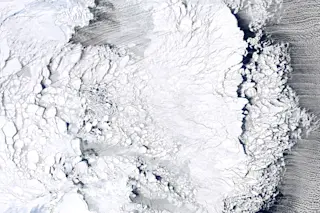The edge of Arctic sea ice in the Barents Sea between Svalbard and Novaya Zemlya, as seen by NASA's Terra satellite on April 2, 2017. (Source: NASA Worldview) Finally! Some relief from the unrelenting decay in Arctic sea ice. Well, no. I was hoping to be able to report that. But I can't. The National Snow and Ice Data Center's most recent update shows the extent of Arctic sea ice in March dropping to a record low for the month. And that marks the sixth month in a row of record-setting lows. On March 7, the extent of Arctic sea ice seems to have reached its maximum extent for the year, after an entire winter of frigid temperatures. But here too, there was no good news to report: that maximum extent also was noteworthy for being the lowest in the 38-year satellite record. And this is the fourth year in ...
Another month, yet another record low for Arctic sea ice
Arctic sea ice extent hits a record low for March, marking a concerning trend of continuous decline in recent years.
More on Discover
Stay Curious
SubscribeTo The Magazine
Save up to 40% off the cover price when you subscribe to Discover magazine.
Subscribe













